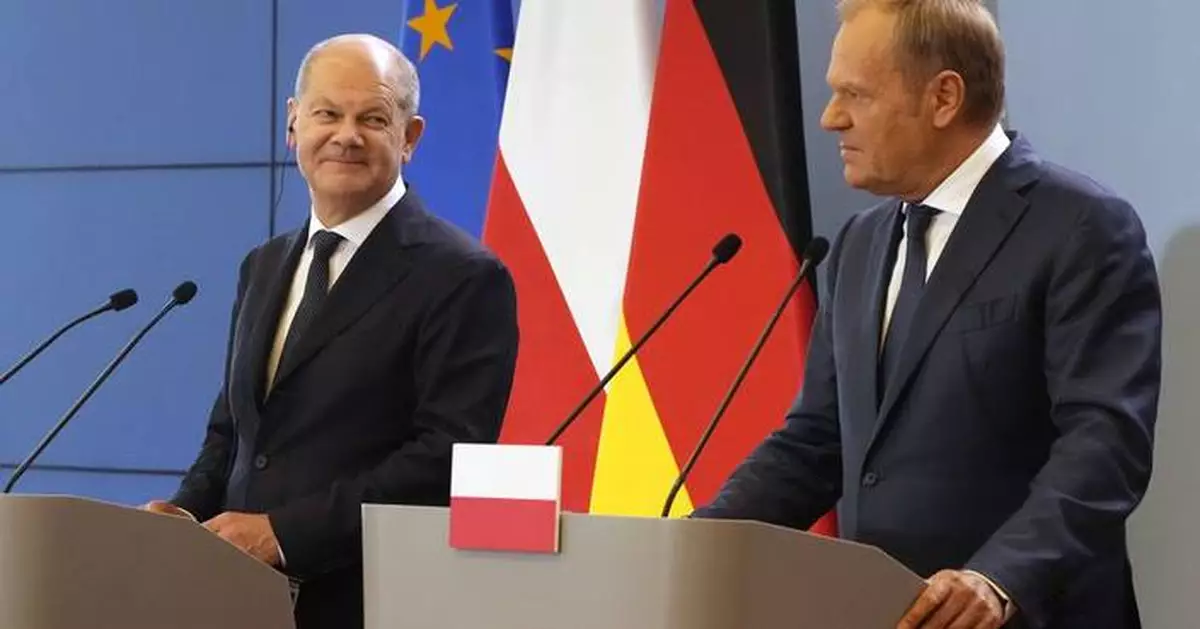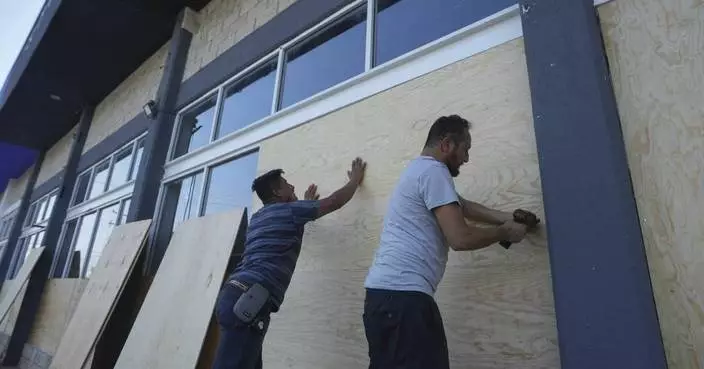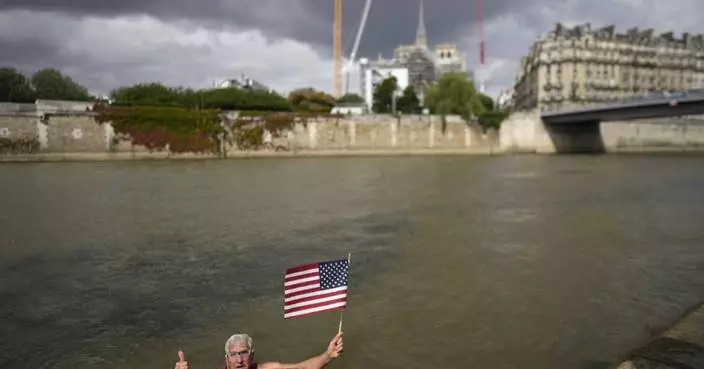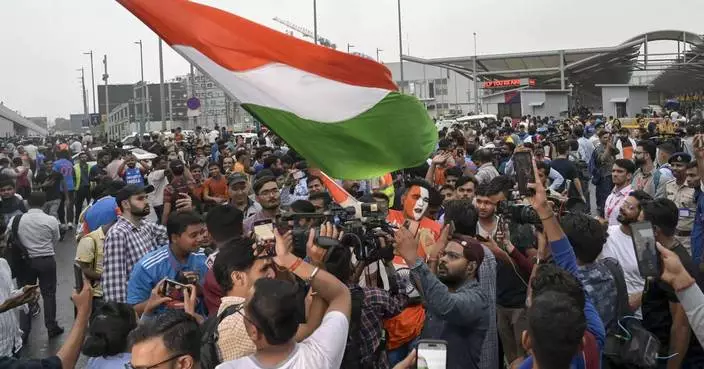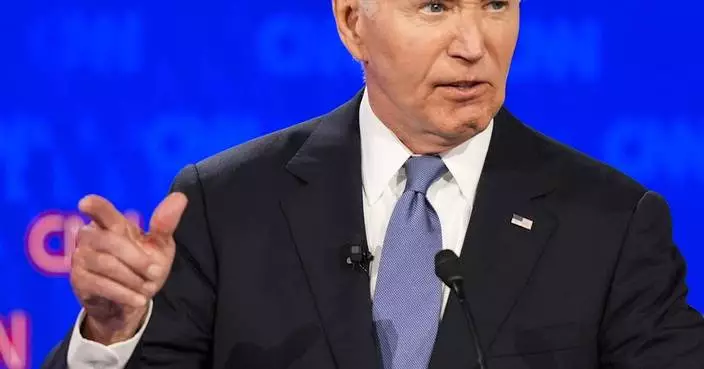WARSAW, Poland (AP) — Government leaders of Poland and Germany on Tuesday held wide bilateral consultations aimed at giving a new impulse to neighborly relations that sagged under Poland’s previous government, and to jointly declare responsibility for Europe’s security in turbulent times.
German Chancellor Olaf Scholz traveled with 12 ministers and government members, including Defense Minister Boris Pistorius, for the meeting in Warsaw.
Click to Gallery
WARSAW, Poland (AP) — Government leaders of Poland and Germany on Tuesday held wide bilateral consultations aimed at giving a new impulse to neighborly relations that sagged under Poland’s previous government, and to jointly declare responsibility for Europe’s security in turbulent times.
German Chancellor Olaf Scholz, center left, and Polish Prime Minister Donald Tusk, center right, review the guard of honor before German-Polish inter-governmental consultations in front of Prime Minister Chancellery in Warsaw, Poland, Tuesday, July 2, 2024. (AP Photo/Czarek Sokolowski)
German Chancellor Olaf Scholz, center left, and Polish Prime Minister Donald Tusk, cener right, review the guard of honor before German-Polish inter-governmental consultations in front of Prime Minister Chancellery in Warsaw, Poland, Tuesday, July 2, 2024. (AP Photo/Czarek Sokolowski)
German Chancellor Olaf Scholz, center left, and Polish Prime Minister Donald Tusk, center right, review the guard of honor before German-Polish inter-governmental consultations in front of Prime Minister Chancellery in Warsaw, Poland, Tuesday, July 2, 2024. (AP Photo/Czarek Sokolowski)
German Chancellor Olaf Scholz, left, and Polish Prime Minister Donald Tusk review the guard of honor before German-Polish inter-governmental consultations in front of Prime Minister Chancellery in Warsaw, Poland, Tuesday, July 2, 2024. (AP Photo/Czarek Sokolowski)
German Chancellor Olaf Scholz, left, and Polish Prime Minister Donald Tusk attend a press conference after German-Polish inter-governmental consultations in front of Prime Minister Chancellery in Warsaw, Poland, Tuesday, July 2, 2024. (AP Photo/Czarek Sokolowski)
German Chancellor Olaf Scholz, left, and Polish Prime Minister Donald Tusk attend a press conference after German-Polish inter-governmental consultations in Warsaw, Poland, Tuesday, July 2, 2024. (AP Photo/Czarek Sokolowski)
German Chancellor Olaf Scholz, left, and Polish Prime Minister Donald Tusk attend a press conference after German-Polish inter-governmental consultations in Warsaw, Poland, Tuesday, July 2, 2024. (AP Photo/Czarek Sokolowski)
“We bring a very clear message: Germany and Poland are good neighbors, close partners and reliable friends. And we want to create a new dynamic for our cooperation,” Scholz told a joint news conference with Tusk.
He stressed that “close partnership between Germany and Poland is very important to us.”
The two pro-European leaders were tightening ties at a time when support is surging in Europe for euroskeptic far-right parties and days after a first round of parliamentary elections in France brought the far right there closer than ever to government.
Wide bilateral consultations between Germany and Poland were most recently held in November 2018. After that, Poland’s right-wing government that was in power until last year adopted a hostile attitude toward Berlin, accusing Germany of excessive influence on European Union decision-making, and focusing on demanding some $1.3 trillion in reparations for the losses that Nazi German occupation caused Poland during World War II.
Tusk's government, which took office in December, is taking steps to mend the ties. They gained special significance in the face of Russia's war on Ukraine, just across Poland's and the 27-member EU's eastern border, and pressure of irregular migration from the Middle East and Africa, which Poland and the EU say is a part of Russia's and ally Belarus' hybrid war on Europe.
Tusk, a former EU Council head, said that Poland's and the continent's security was his priority and that “no one should have any doubts as to the importance of good cooperation in this area between Poland and Germany.”
Tusk said it was with great satisfaction that he heard Scholz's declaration that Germany is ready to take co-responsibility for the security of Poland's eastern border, through investment into the infrastructure and other security needs there. He criticized European countries for lacking coordination and determination in taking steps for the continent's joint security.
“The security of Germany and Poland is inextricably linked. This means that Poland’s security is also Germany’s security," Scholz said.
"This is what we stand for as neighbors, as NATO allies and as partners in the European Union. Our solidarity and our joint action are our common strength,” he said.
Scholz also pledged to “take measures to support the surviving victims of the German attack and occupation in the years 1939-45” in Poland and to “strengthen remembrance and commemoration of our painful shared history” by commemorating the Polish victims through the establishment of a German-Polish House that is "intended to be a visible sign against forgetting and a warning for the future.”
——
AP writer Kirsten Grieshaber in Berlin contributed to this report.
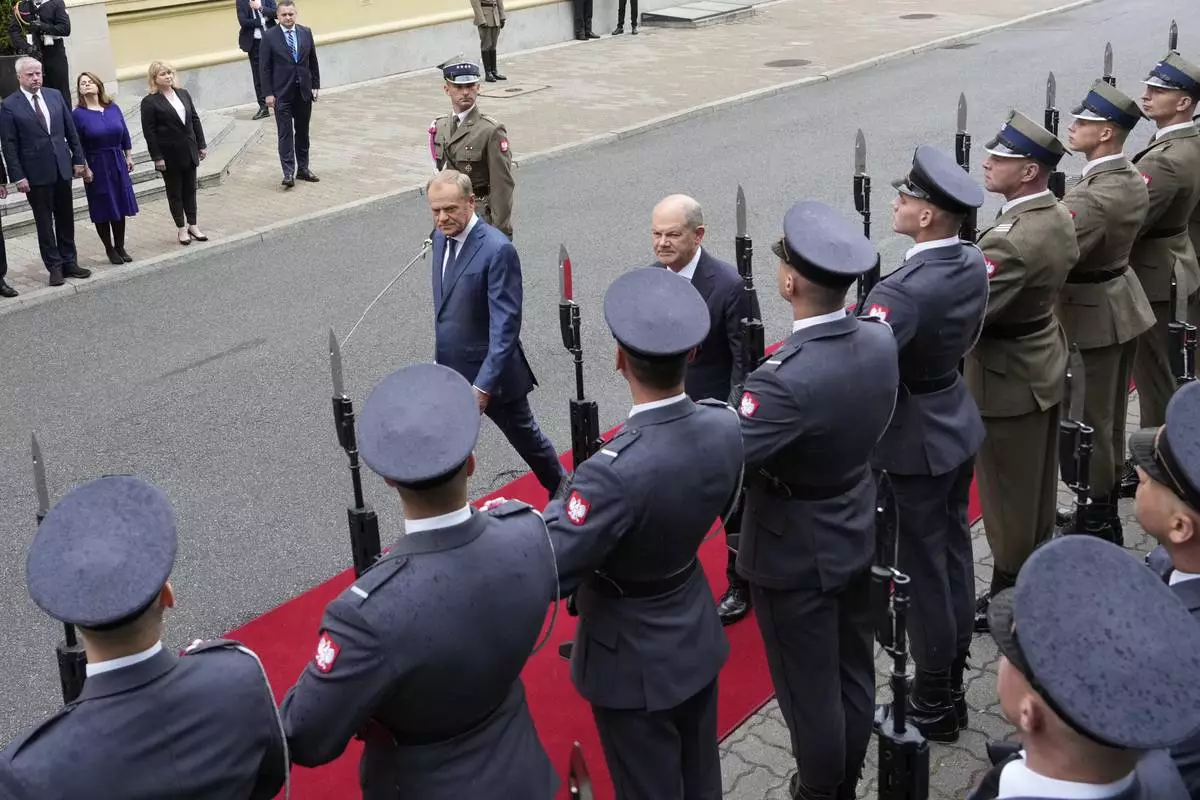
German Chancellor Olaf Scholz, center right, and Polish Prime Minister Donald Tusk review the guard of honor before German-Polish inter-governmental consultations in front of Prime Minister Chancellery in Warsaw, Poland, Tuesday, July 2, 2024. (AP Photo/Czarek Sokolowski)
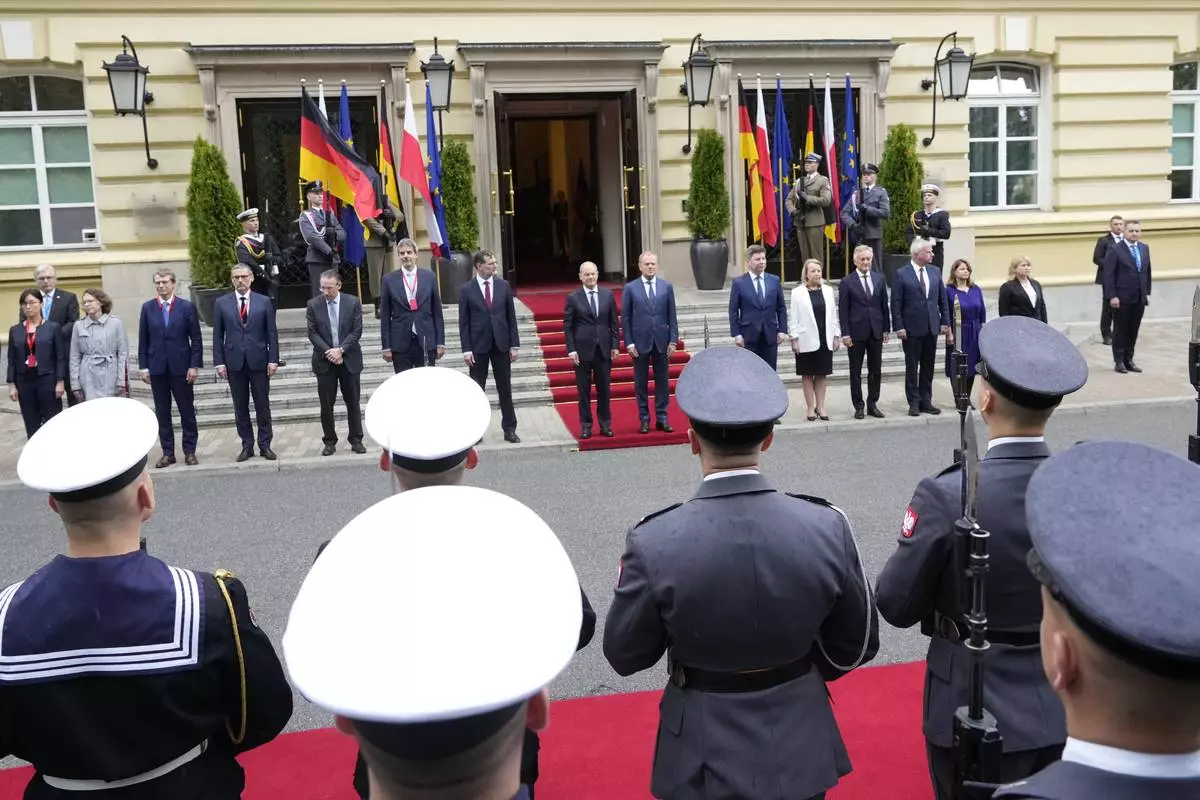
German Chancellor Olaf Scholz, center left, and Polish Prime Minister Donald Tusk, center right, review the guard of honor before German-Polish inter-governmental consultations in front of Prime Minister Chancellery in Warsaw, Poland, Tuesday, July 2, 2024. (AP Photo/Czarek Sokolowski)
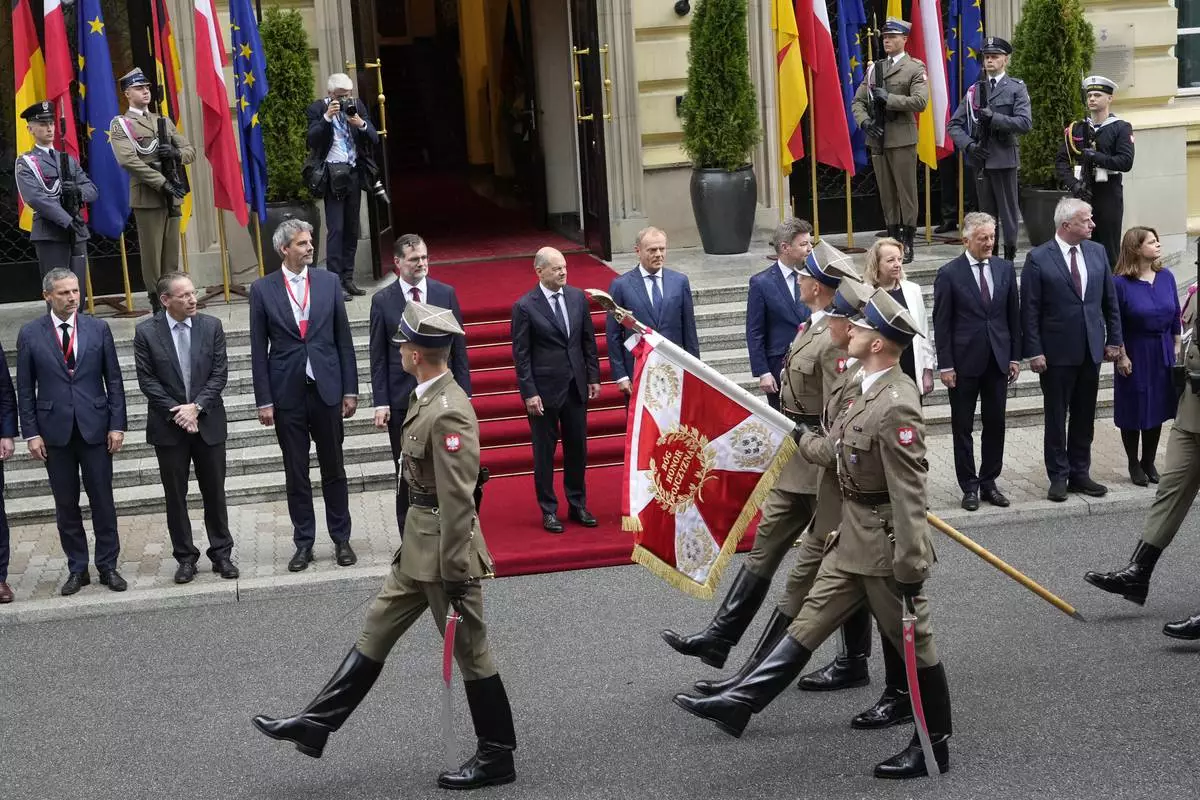
German Chancellor Olaf Scholz, center left, and Polish Prime Minister Donald Tusk, cener right, review the guard of honor before German-Polish inter-governmental consultations in front of Prime Minister Chancellery in Warsaw, Poland, Tuesday, July 2, 2024. (AP Photo/Czarek Sokolowski)
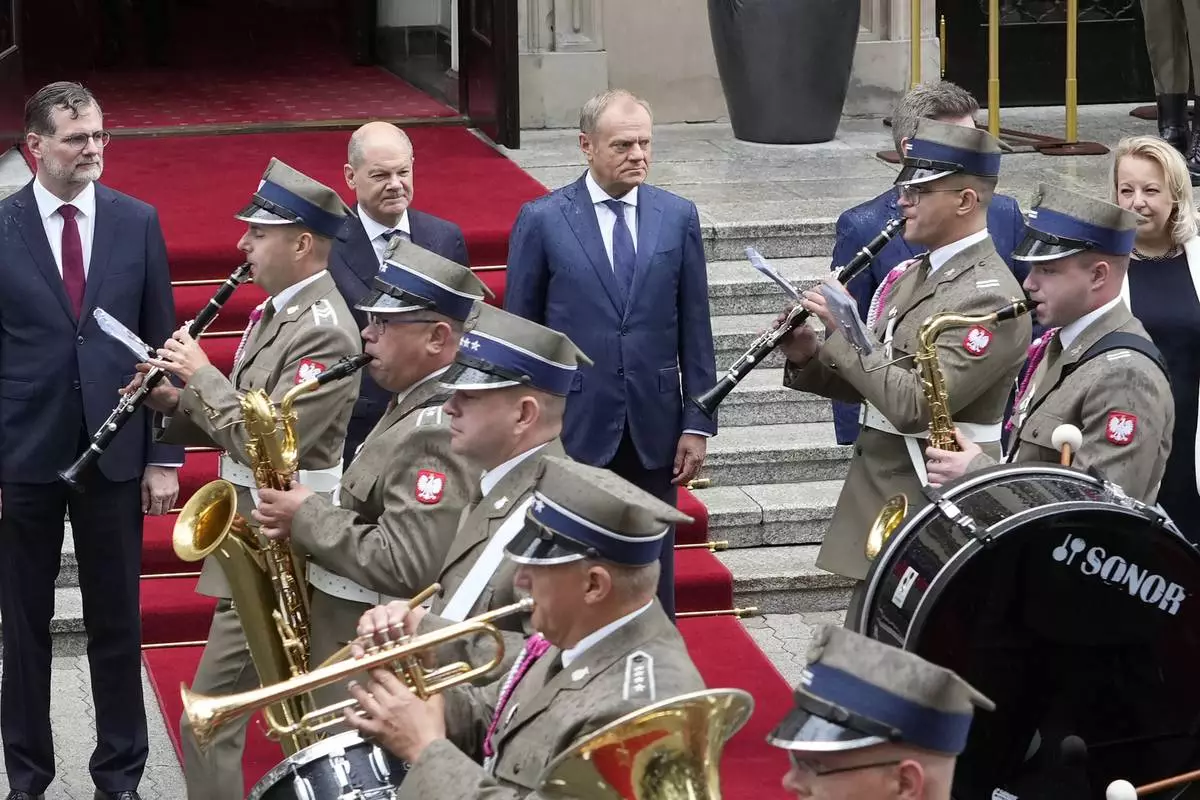
German Chancellor Olaf Scholz, center left, and Polish Prime Minister Donald Tusk, center right, review the guard of honor before German-Polish inter-governmental consultations in front of Prime Minister Chancellery in Warsaw, Poland, Tuesday, July 2, 2024. (AP Photo/Czarek Sokolowski)
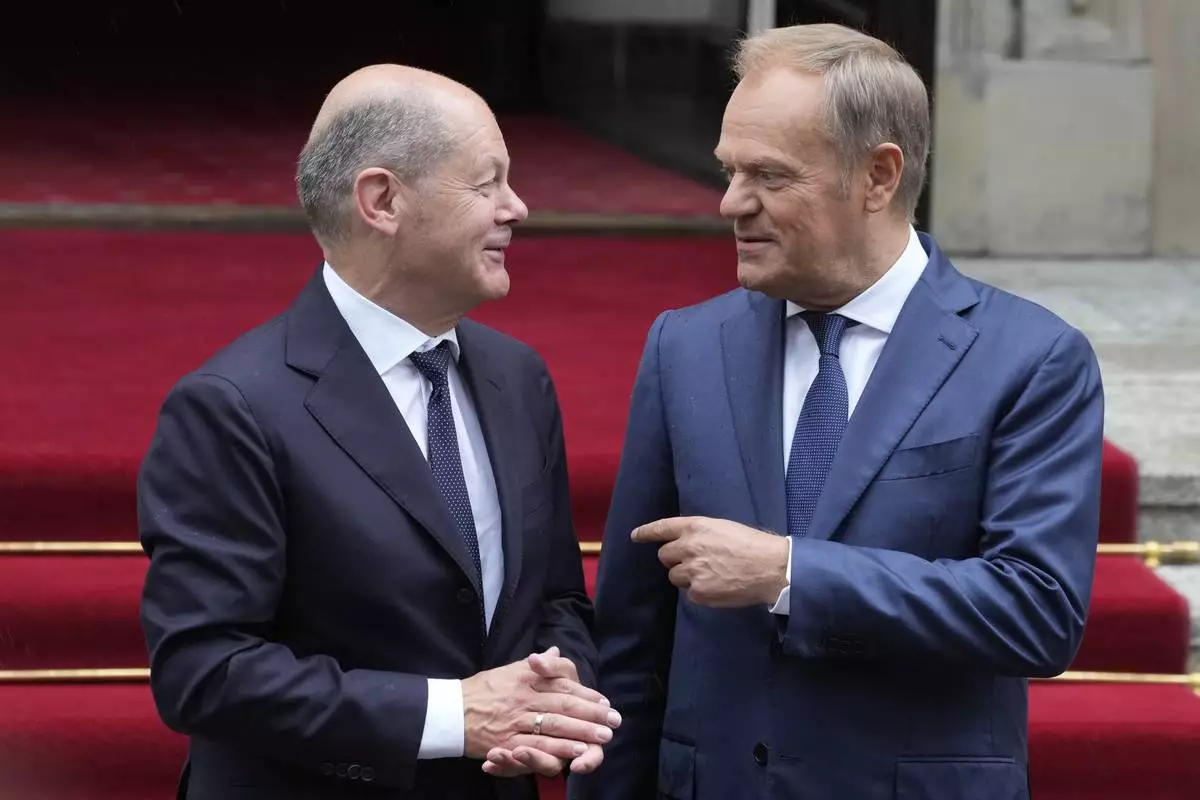
German Chancellor Olaf Scholz, left, and Polish Prime Minister Donald Tusk review the guard of honor before German-Polish inter-governmental consultations in front of Prime Minister Chancellery in Warsaw, Poland, Tuesday, July 2, 2024. (AP Photo/Czarek Sokolowski)
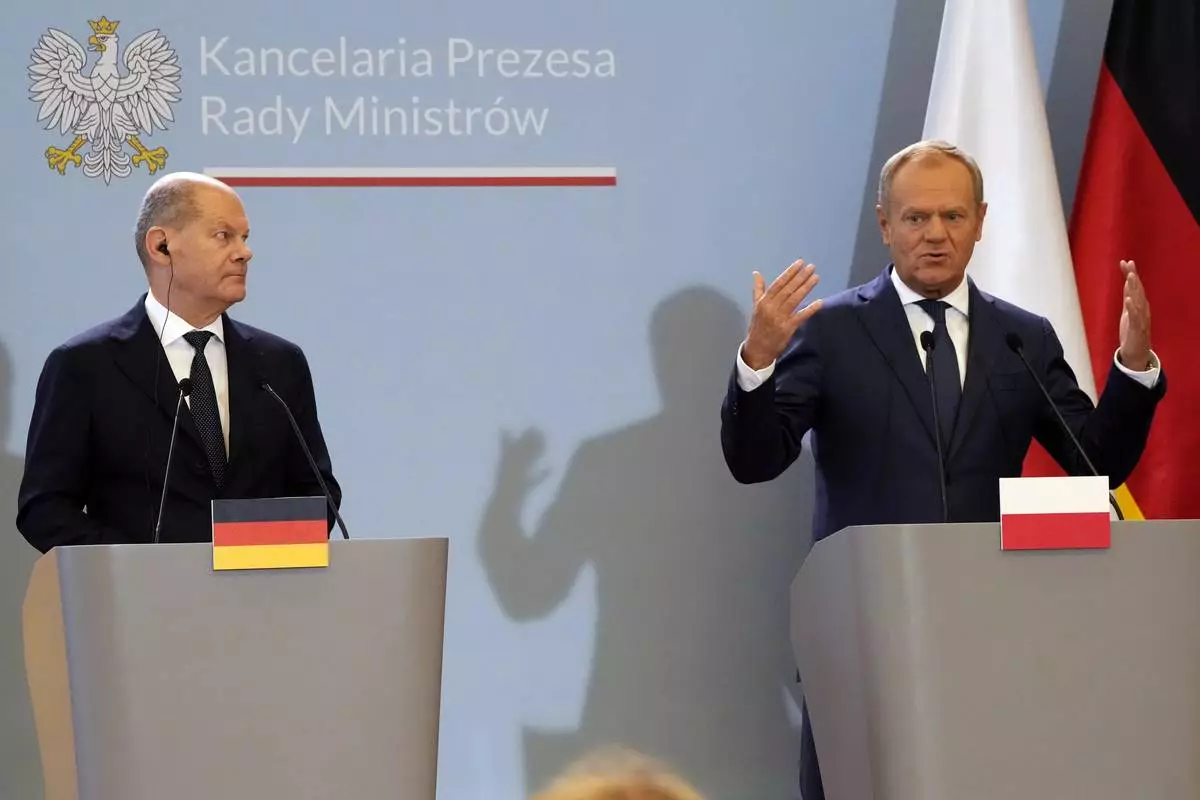
German Chancellor Olaf Scholz, left, and Polish Prime Minister Donald Tusk attend a press conference after German-Polish inter-governmental consultations in front of Prime Minister Chancellery in Warsaw, Poland, Tuesday, July 2, 2024. (AP Photo/Czarek Sokolowski)
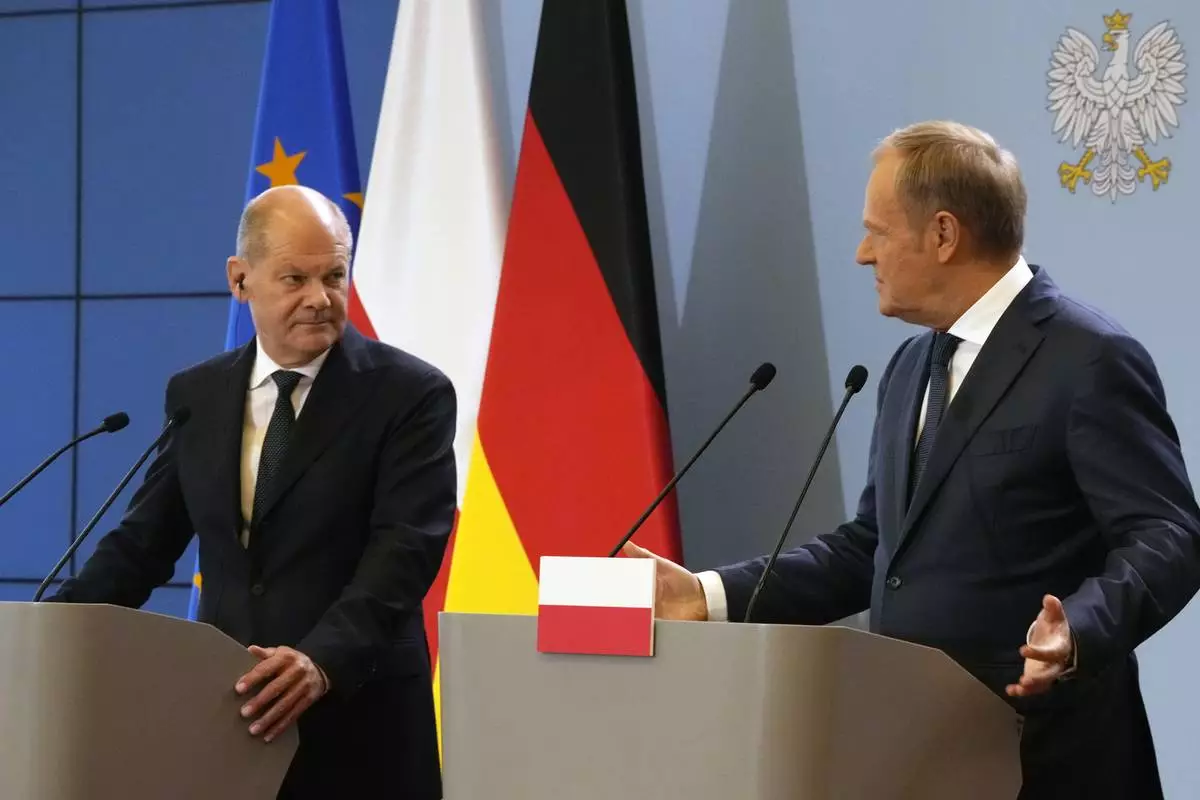
German Chancellor Olaf Scholz, left, and Polish Prime Minister Donald Tusk attend a press conference after German-Polish inter-governmental consultations in Warsaw, Poland, Tuesday, July 2, 2024. (AP Photo/Czarek Sokolowski)
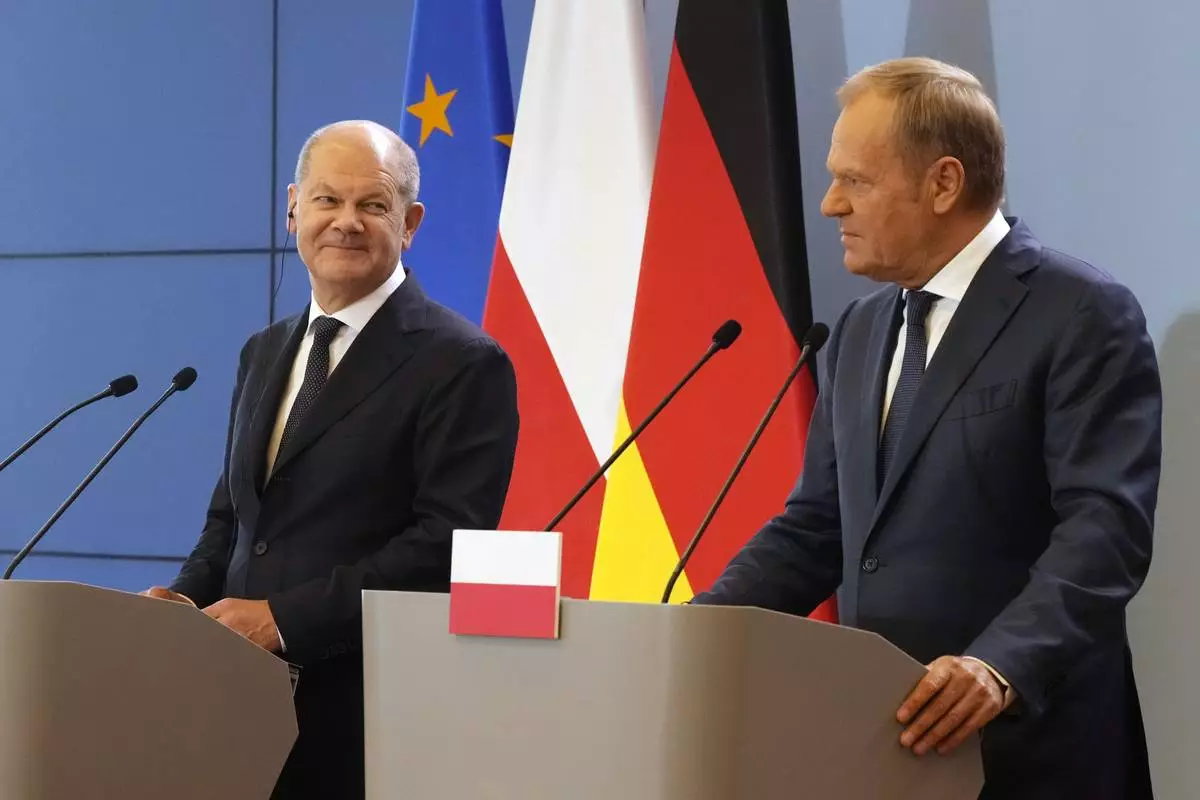
German Chancellor Olaf Scholz, left, and Polish Prime Minister Donald Tusk attend a press conference after German-Polish inter-governmental consultations in Warsaw, Poland, Tuesday, July 2, 2024. (AP Photo/Czarek Sokolowski)
JERUSALEM (AP) — The Israeli government has approved plans to build nearly 5,300 new homes in settlements in the occupied West Bank, a monitoring group said Thursday, the latest in a campaign to accelerate settlement expansion, aimed at cementing Israeli control over the territory and preventing the establishment of a future Palestinian state.
Word of the decision emerged as diplomatic efforts aimed at ending the nine-month war in Gaza appeared to be stirring back to life after a weekslong hiatus. Prime Minister Benjamin Netanyahu's office said he had decided to send negotiators to resume negotiations. A day earlier, the militant Hamas group handed mediators its latest response to a U.S.-backed proposal for a deal.
Fighting intensified between Israel and Lebanon’s Hezbollah, with the militant group saying Thursday it fired more than 200 rockets and exploding drones into northern Israel to avenge the killing of a senior commander in an Israeli airstrike the day before.
Months of exchanges have literally set the Israeli-Lebanese border ablaze and raised fears of a potentially even more devastating war in the Middle East. Hezbollah has said it will halt its attacks if there is a cease-fire between Hamas — a fellow Iran-backed ally — and Israel.
Israel's turbocharged settlement drive threatens to further stoke tensions in the West Bank, which has seen a surge in violence since the war in Gaza began on Oct. 7.
The Israeli anti-settlement monitoring Peace Now said the government's Higher Planning Council had approved or advanced plans for 5,295 homes in dozens of settlements across the West Bank. It also “legalized” three informal outposts as new neighborhoods of existing settlements in the Jordan Valley and near the city of Hebron.
On Wednesday, Peace Now said Israel approved the largest seizure of land in the West Bank in over three decades. COGAT, the Israeli defense body that oversees the planning council, referred questions to Netanyahu's office, which did not immediately respond to a request for comment.
Netanyahu’s government is dominated by settlers and their supporters. The hard-line nationalist finance minister, Bazalel Smotrich, himself a settler, has been put in charge of settlement policy and has said his rapid expansion drive is in part intended to ensure a Palestinian state cannot be created. In an escalation over past months, settlers have carried out more than 1,000 attacks on Palestinians, causing deaths, damaging property and in some cases prompting Palestinians to flee villages.
The Palestinians seek the West Bank, east Jerusalem and Gaza – areas captured by Israel in the 1967 Mideast war – for an independent state.
The new housing approvals could also rankle Israel’s ally, the United States, which speaks out against settlements, though it has done little to pressure Israel on the issue. The question of Palestinian statehood has become enmeshed in efforts for a long-term resolution for Gaza. The U.S. has raised the idea of the West Bank-based Palestinian Authority governing Gaza in any post-war scenario and has called for a revival of the peace process to lead to a Palestinian state.
Netanyahu has firmly rejected both ideas.
The revival of cease-fire talks appeared to mark another attempt by U.S., Qatari and Egyptian mediators to overcome the gap that has repeatedly thwarted a deal over the past months. Hamas wants a deal that ensures Israeli troops fully leave Gaza and the war ends; Netanyahu says the war cannot end before Hamas is eliminated.
Gaza’s Health Ministry said Thursday that the number of Palestinians killed by Israel’s campaign in Gaza had climbed past 38,000. The ministry does not differentiate between combatants and civilians in its count. The war began when Hamas-led militants launched a surprise attack on Oct. 7 into southern Israel, killing around 1,200 people and abducting another 250 people.
Netanyahu spoke Thursday with President Joe Biden to discuss his decision to send a delegation to continue negotiations, Netanyahu's office said. He also told Biden Israel is committed "to finish the war only after achieving all of its objectives” — a reference to the twin war goals of rescuing hostages and destroying Hamas.
The U.S. has rallied world support behind a plan for a phased cease-fire in Gaza that calls for the release of all hostages still held by Hamas in return for a lasting truce and the withdrawal of Israeli forces from Gaza.
So far, neither side appears to have fully embraced it.
Last month, Hamas suggested “amendments” to the proposal, some of which the U.S. said were unworkable. Talks ground to a halt. After the U.S. put forward a new version, Hamas said Wednesday it sent a new response to Egypt and Qatar. Hamas political official Bassem Naim said the group “responded with some ideas to bridge the gap” between the two sides, without elaborating.
A U.S. official called the response constructive but said more work needed to be done. The official, who wasn’t authorized to comment publicly, spoke on condition of anonymity.
For his part, Netanyahu has given conflicting stances — he has said Israel is committed to the proposal outlined by Biden in a May 31 speech. But in a TV interview last month, he said he was only prepared to make a “partial deal,” and would continue the war "after a pause.”
At its core, the U.S. proposal calls for a three-phase process.
The first phase would bring a cease-fire, a pullback of Israeli forces from all densely populated areas of Gaza and the release of a number of hostages, including women, older people and the wounded, in exchange for the release of hundreds of Palestinian prisoners. After some hostages were released during a November cease-fire, militants still hold around 80 hostages and the remains of 40 others.
During the 42 days of phase one, the parties would negotiate the terms of phase two.
The negotiations are meant to lead to a “sustainable calm” and the withdrawal of all Israeli troops from Gaza – with the release by Hamas of all remaining male hostages in return for an Israeli release of Palestinian prisoners. The third phase would see the return of the remains of hostages.
The transition from the first to the second phase has appeared to be the main sticking point.
Hamas is concerned that Israel will restart the war after the first phase, perhaps after making unrealistic demands in the talks. Israeli officials have said they want the negotiations to lead to Hamas’ removal from power in Gaza — a provision not spelled out in the proposal. They have also pushed for a time limit on negotiations to keep pressure on Hamas and prevent it from drawing out talks and the initial cease-fire.
Chehayeb reported from Beirut. Associated Press writers Abby Sewell in Beirut and Aamer Madhani in Washington contributed to this report.
Follow AP’s coverage of the war in Gaza at https://apnews.com/hub/israel-hamas-war
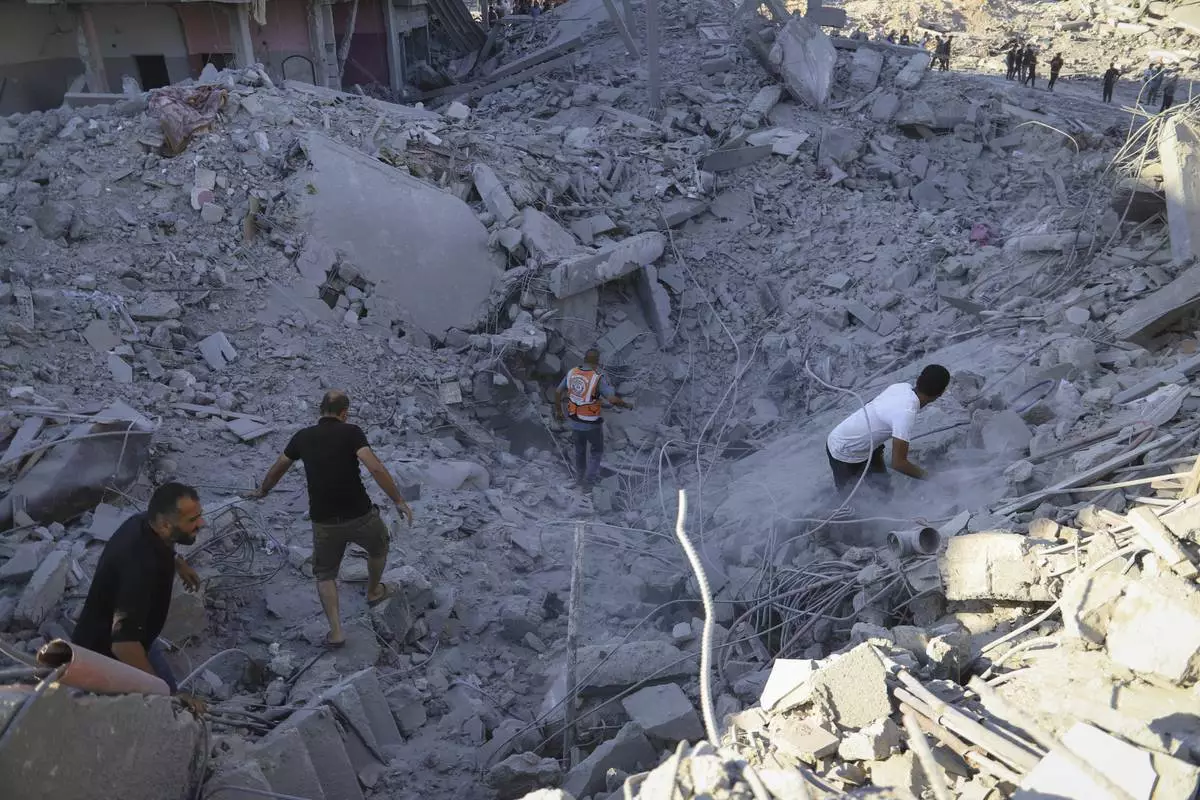
Palestinians search for bodies and survivors in the rubble of a residential building destroyed in an Israeli airstrike in Khan Younis, Gaza Strip, Wednesday, July 3, 2024. (AP Photo /Jehad Alshrafi)
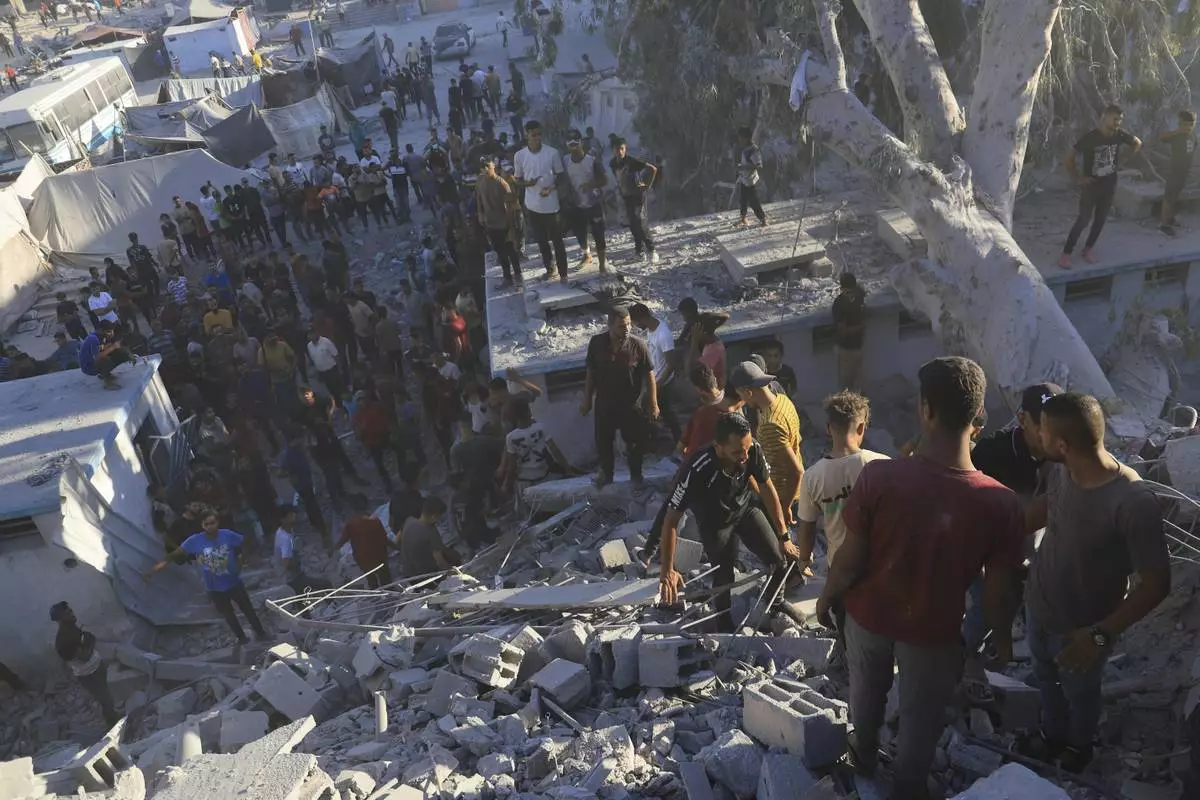
Palestinians search for bodies and survivors in the rubble of a residential building destroyed in an Israeli airstrike in Khan Younis, Gaza Strip, Wednesday, July 3, 2024. (AP Photo /Jehad Alshrafi)
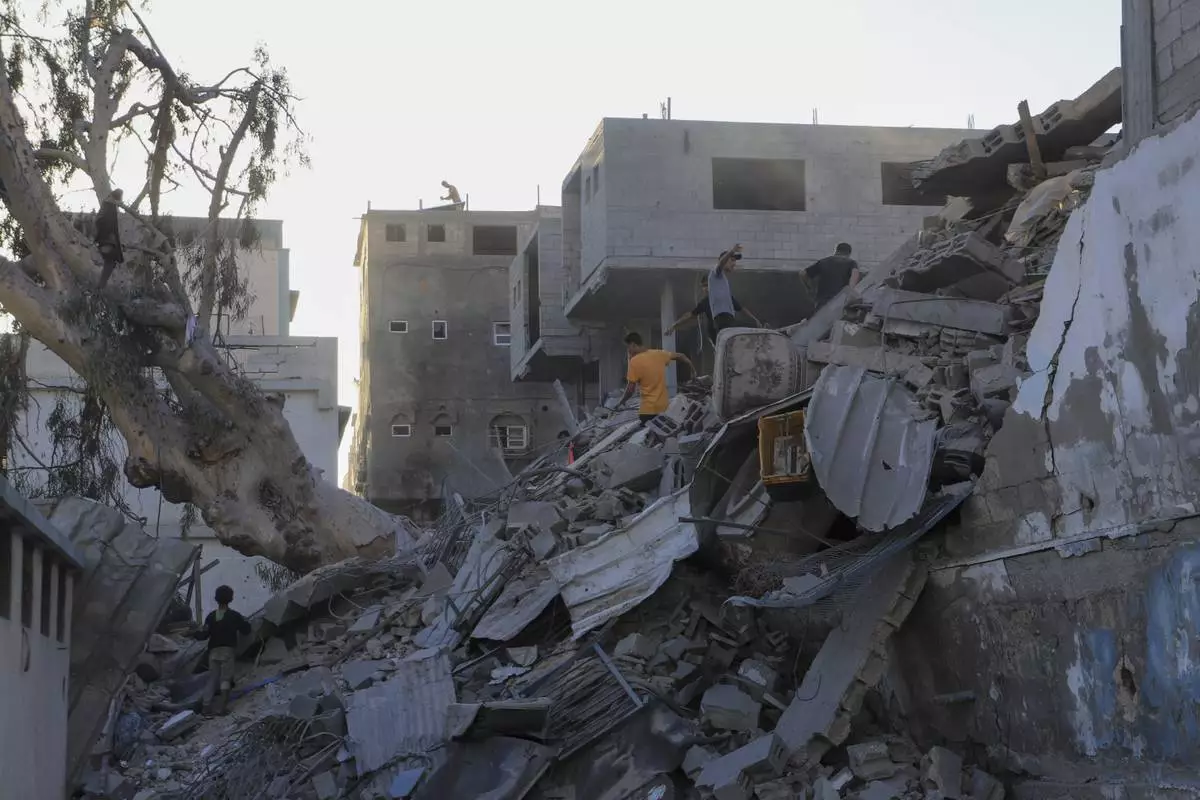
Palestinians search for bodies and survivors in the rubble of a residential building destroyed in an Israeli airstrike in Khan Younis, Gaza Strip, Wednesday, July 3, 2024. (AP Photo /Jehad Alshrafi)
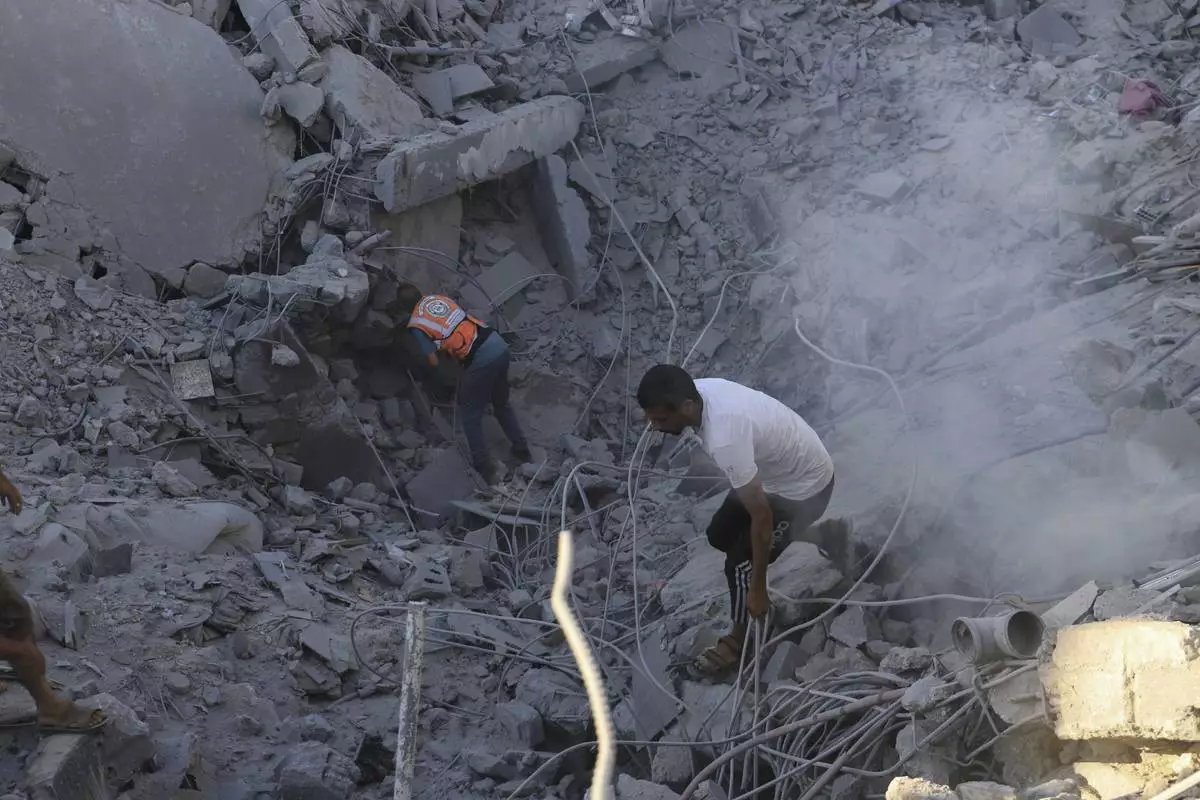
Palestinians search for bodies and survivors in the rubble of a residential building destroyed in an Israeli airstrike in Khan Younis, Gaza Strip, Wednesday, July 3, 2024. (AP Photo /Jehad Alshrafi)










